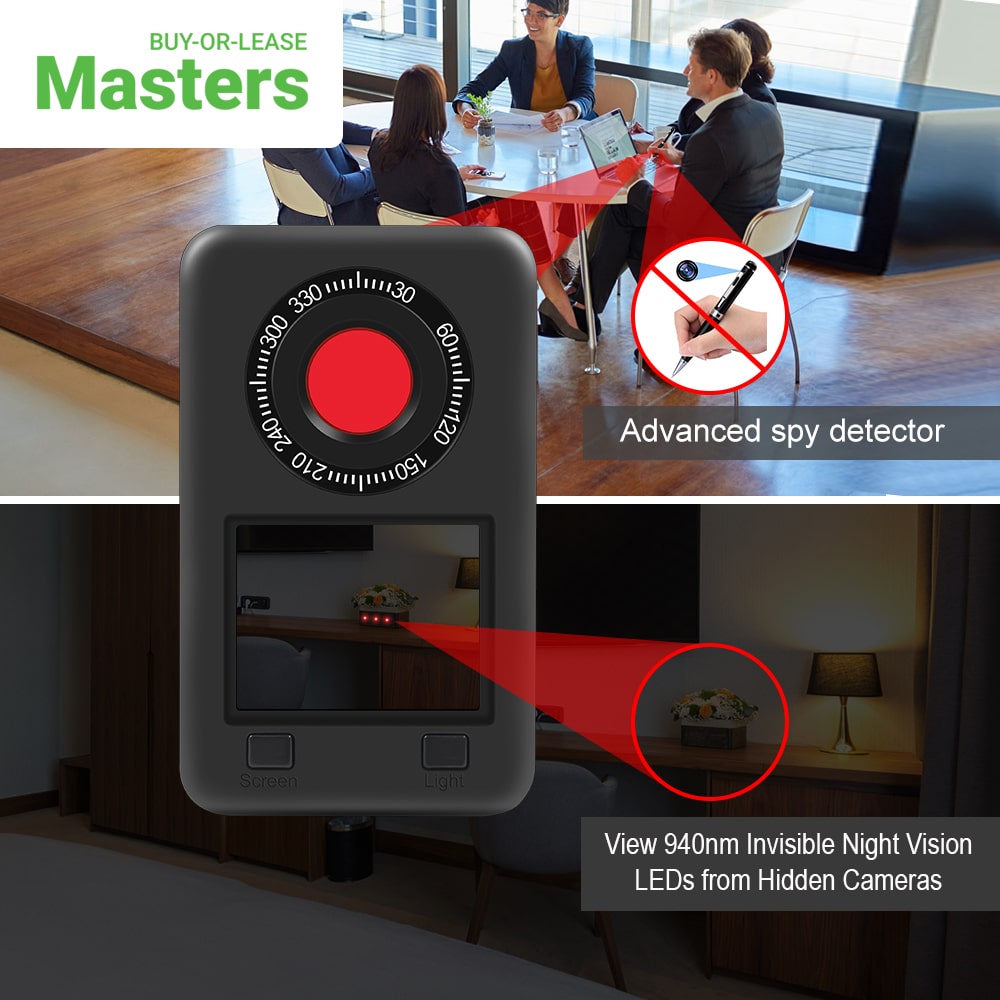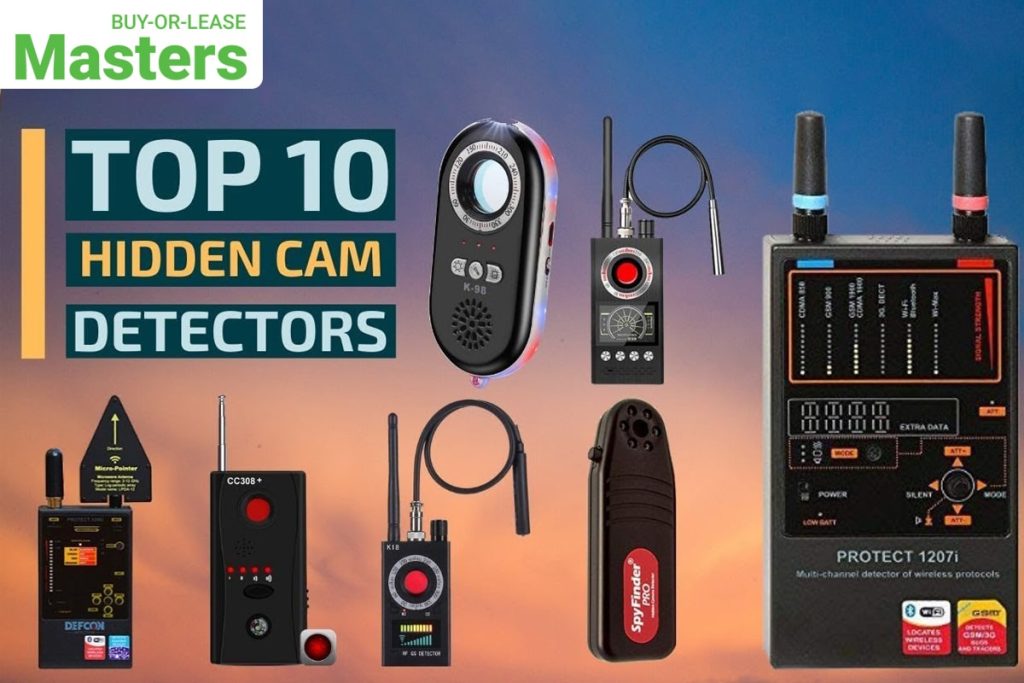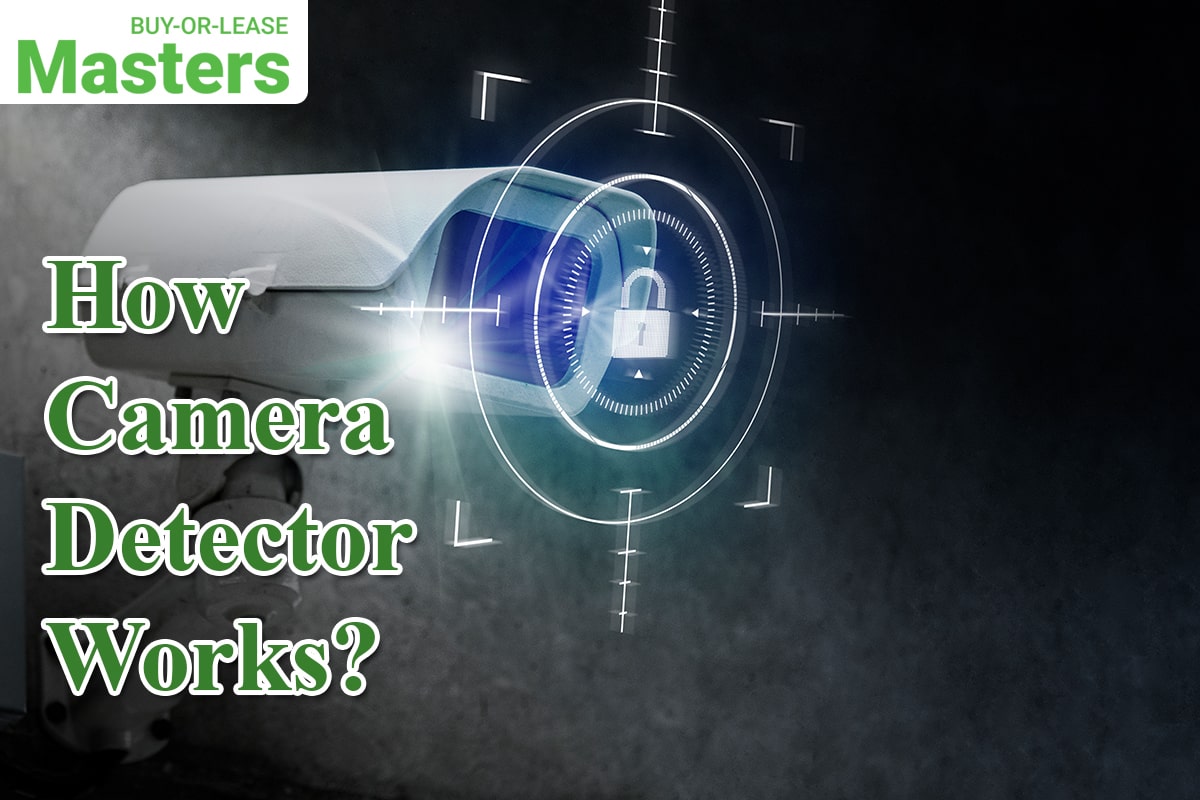Camera detector is an essential tool in the world of surveillance and security. It’s a technological advancement that has revolutionized modern monitoring systems. Cameras have become commonplace, used to monitor all types of areas such as homes, businesses, government buildings and even outdoors spaces.
Whether you are looking for increased security or peace of mind when it comes to the safety of your family or staff, having a camera detector installed is a must-have in today’s digital age. Today, Mastersbuyorlease will dive into the inner workings of camera detectors how they work and what makes them so beneficial for home defense purposes. We’ll also look at practical applications and ways thatcamera detectors can be utilized more effectively within your own property. By reading through this article you will gain insights into innovative technologies that could enrich and improve your daily life.
What is a camera detector?

A camera detector is a device designed to detect the presence of hidden cameras within a specific area. It essentially works as an electronic sniffer, detecting electromagnetic radiation emitted by wireless cameras or other devices that may be used for spying purposes. This includes Wi-Fi enabled cameras, Bluetooth-enabled cameras, and even infrared cameras.
How does camera detector work?
Camera detectors work by scanning the surrounding area for any signals that may indicate the presence of a camera. As mentioned earlier, this includes electromagnetic radiation. The detector’s antenna picks up these signals and alerts the user through visual or audio cues.
Additionally, some advanced models can differentiate between legitimate devices (such as routers or phones) and potential hidden cameras, reducing the number of false alarms.
1. Passive infrared motion detector (PIR) technology
One of the most commonly used technologies in camera detectors is Passive Infrared Motion Detection. PIR sensors detect changes in infrared energy within their field of view, such as body heat or movement. This makes them ideal for detecting hidden cameras that emit infrared radiation.
This sensor is specifically designed for monitoring indoor areas. The PIR detector has a detection range of 9 meters.
2. Motion-in-picture detector (MIP) technology
Motion-In-Picture detectors use a combination of optical and thermal sensors to detect hidden cameras. They work by detecting any unusual changes in the picture that could indicate the presence of a camera, such as heat sources or reflective surfaces.
3. Glass break detector (GBS) technology
Glass break detectors are a type of acoustic sensor that detects the sound frequency of breaking glass. This is useful in detecting hidden cameras that may be disguised as ordinary objects, such as mirrors or picture frames.
This detector functions effectively exclusively within enclosed areas with dimensions of up to 9 x 9 x 3 m. It accurately detects the breakage of a glass area measuring at least 0.4 sqm.
4. Door opening detector (DOOR) technology
DOOR detectors use magnetic sensors to detect the opening of doors or windows. This is useful in detecting hidden cameras that may be installed within door frames or window sills.
5. Noise detector (NOISE) technology
Lastly, noise detectors use microphones to detect any unusual sounds that could indicate the presence of a hidden camera. This includes buzzing or clicking noises that may be emitted by wireless cameras.
You have the flexibility to adjust the sensitivity of the detector to meet your specific needs. When set to a low sensitivity level, the detector will only pick up loud noises, such as shouting, even at a considerable distance of 4 meters. This ensures that the detector focuses solely on significant sound events, allowing for more accurate and reliable detection.
6. Tilt detector (TILT) technology
Tilt detectors are often used in combination with other technologies to create a more comprehensive camera detection system. They use accelerometers and gyroscopes to detect any changes in orientation or movement that could indicate the presence of a hidden camera.
7. Touch detector (TOUCH) technology
TOUCH detectors use capacitive sensors to detect any changes in the electric field within their immediate surroundings. This includes any potential interference from hidden cameras, making them useful in detecting wired or wireless cameras.
Read more: How Camera Lucida Works?
Setting of detectors

If a camera detector is turned on, it can respond to its activation in three different ways. It can either be constantly active, wake up the camera only, or become active after wake-up.
- The camera is intelligently designed to ensure maximum security. When the always active detector is triggered and the camera is in WATCH mode, it immediately activates an alarm, alerting you to any potential threats. Moreover, even in SLEEP mode, the TILT and TOUCH detectors are programmed to activate the alarm, providing an extra layer of protection. This meticulous security measure is put in place to safeguard the camera and provide you with peace of mind, knowing that your surroundings are under constant surveillance.
- To ensure efficient operation, the camera should only be activated when the detector is triggered. This activation occurs during a specific duration referred to as the wake-up time. Additionally, detectors that remain active after waking up will also be activated for optimal functionality.
- The active after wake-up mode, which is a feature of the detector, implies that the detector is only active during the designated wake-up time. Once the wake-up time ends, the detector returns to the idle state, patiently waiting for activation by another detector. Furthermore, it’s worth noting that the detector is designed to automatically awaken after an alarm is triggered, ensuring continuous surveillance and prompt response.
Detectors are equipped with 5 levels of sensitivity on a scale ranging from -1 to 1. At -1, the sensitivity is very low, meaning the detector will only be triggered by significant changes in the environment. Conversely, at 1, the sensitivity is very high, causing the detector to respond to even minor changes in the environment.
Benefits of using a camera detector
1. Enhanced security and privacy
The primary purpose of a camera detector is to protect your privacy and security by alerting you to the presence of any hidden cameras. This can be particularly useful in situations where you may not have control over your surroundings, such as hotel rooms or public restrooms.
2. Peace of mind
Knowing that you have an extra layer of protection against potential hidden cameras can provide peace of mind, especially if you are in a new or unfamiliar environment. This can help alleviate any anxieties or worries you may have about being monitored without your knowledge.
3. Easy to use
Most camera detectors are designed to be user-friendly and require little to no technical knowledge to operate. They often come with clear instructions and intuitive controls, making it easy for anyone to use.
4. Versatility
Camera detectors can be used in various settings, including homes, offices, hotels, and public spaces. This versatility allows you to protect yourself and your privacy regardless of where you are.
5. Cost-effective
Investing in a camera detector can save you time and money in the long run. By detecting hidden cameras early on, you can avoid any potential privacy violations or security breaches that may result in costly legal proceedings.
Practical applications of a camera detector
1. Personal use
Camera detectors are commonly used by individuals who want to ensure their privacy and security in personal spaces. This includes homes, hotel rooms, and even vehicles.
2. Business use
Businesses may also utilize camera detectors to protect sensitive information or trade secrets from being recorded without consent. They can be particularly useful in conference rooms or meeting spaces.
3. Law enforcement
Law enforcement agencies may use camera detectors during investigations to gather evidence or identify potential surveillance devices in a crime scene.
4. Traveling
Travelers can also benefit from using a camera detector in hotel rooms or rental accommodations to ensure their privacy and security while away from home.
How to choose the right camera detector for your needs
When looking for a camera detector, there are a few key factors to consider:
- Sensitivity level: Choose a detector with adjustable sensitivity levels to meet your specific needs and environment.
- Detection range: Consider the distance at which the detector can pick up signals from hidden cameras.
- Type of detectors: Decide whether you need a combination of detectors (e.g., TILT, TOUCH) or just one specific type.
- Battery life: Look for a detector with a long battery life to ensure continuous surveillance.
- Additional features: Some detectors may come with extra features such as audio detection or night vision, so consider what features are important to you.
Camera detectors play a crucial role in protecting your privacy and security. By understanding how they work and considering their potential uses and benefits, you can make an informed decision about whether a camera detector is right for you. With the increasing prevalence of hidden cameras, investing in a reliable camera detector can provide peace of mind and ensure your safety in various settings. So, it’s essential to choose a high-quality detector that meets your specific needs and preferences for optimal performance. Stay safe and protected with a camera detector by your side! So, it’s essential to choose a high-quality detector that meets your specific needs and preferences for optimal performance. Stay safe and protected with a camera detector by your side.
Additional content: How to detect hidden cameras without using a camera detector
While investing in a reliable camera detector is the most efficient way to detect hidden cameras, there are a few other methods you can use in case you don’t have one available. These include:
- Physical inspection: The most basic method of detecting hidden cameras is by conducting a thorough physical inspection of the area. Look for any unusual objects or devices that may be cameras, such as smoke detectors or wall clocks with small holes.
- Use a flashlight: Shine a bright flashlight around the room and check for any unusual glints or reflections that may indicate the presence of a camera lens.
- Check for wireless signals: Hidden cameras often use Wi-Fi signals to transmit footage, so you can use your phone’s Wi-Fi signal detector to scan for any unknown networks in the area.
- Download an app: There are various apps available for both iOS and Android devices that claim to be able to detect hidden cameras using your phone’s camera and flash. However, these may not always be reliable.
- Hire a professional: If you have reason to believe there may be hidden cameras in a specific location, it is best to hire a professional security team or private investigator with specialized equipment to conduct a thorough sweep. Ultimately, investing in a camera detector is the most effective way to ensure your privacy and security in any given situation. However, knowing these alternative methods can provide an added layer of protection and peace of mind. Regardless of which method you choose, always remember to respect others’ privacy while protecting your own. Stay vigilant and stay safe!
Ultimately, investing in a camera detector is the most effective way to ensure your privacy and security in any given situation. However, knowing these alternative methods can provide an added layer of protection and peace of mind. Regardless of which method you choose, always remember to respect others’ privacy while protecting your own. Stay vigilant and stay safe!
Tips on using camera detectors more effectively for home defense
- Know your surroundings: Before setting up the detector, familiarize yourself with the layout of your home and any potential hiding spots for cameras.
- Regularly scan for hidden cameras: Make it a habit to regularly scan your living spaces with a camera detector to ensure no new devices have been installed without your knowledge.
- Don’t forget about battery life: Keep spare batteries on hand and regularly check the battery life of your detector to ensure it is always functioning properly.
- Adjust sensitivity levels: Adjust the sensitivity level of your detector according to the size and layout of the room you are scanning for optimal results.
- Educate others: Make sure everyone in your household knows how to use the camera detector effectively and understands the importance of protecting your privacy.
Using a camera detector for home defense can provide peace of mind and ensure your safety in your own space. By following these tips, you can make the most out of your camera detector and protect yourself from potential invasion of privacy. Remember to always use the detector responsibly and within legal boundaries.
Conclusion
Camera detectors are an invaluable tool to keep yourself, your family and belongings safe. Whether you’re looking for increased security or peace of mind when it comes to defending your home or business, installing a camera detector is essential in this modern age of digital surveillance. Affordable and easy to set up, these devices offer a seamless and efficient way of managing the safety of your area. Today, Mastersbuyorlease has explored the inner workings of how camera detectors work as well as their many practical applications that can be utilized on any property.
With this knowledge, you should feel more equipped and informed about the features available to provide optimal protection for not only yourself but those around you. If you have enjoyed reading this article about camera detector systems then why not leave a comment below and let us know your thoughts? We’d love to hear from you.
Frequently asked questions (FAQs):
- What is the purpose of a camera detector?
- How accurate are camera detectors?
- Do I need a camera detector for home defense?
- How does focus work on a lens?
FAQs:
- What is the purpose of a camera detector?
A camera detector’s primary purpose is to identify and locate hidden cameras that may be used for surveillance or invasion of privacy.
It can also detect other types of wireless devices, such as listening devices or GPS trackers.
- How accurate are camera detectors?
The accuracy of a camera detector depends on its quality and brand. Higher-end detectors tend to have more advanced features and better accuracy in detecting hidden cameras.
- Do I need a camera detector for home defense?
While it is not a necessity, having a camera detector can provide an added layer of security and peace of mind for your home. It is especially useful in situations where you suspect someone may be invading your privacy. Ultimately, the decision to invest in a camera detector depends on personal preference and comfort level with potential surveillance threats. However, it is always recommended to prioritize safety and take necessary precautions to protect yourself and your loved ones. If you have any doubts or concerns, it is best to consult with a security professional for personalized advice. Remember to always use the detector responsibly and within legal boundaries.
- How does focus work on a lens?
Focusing on something is achieved by adjusting the position of one or more lens elements. By moving these elements closer to or further away from the imaging sensor, the way the lens bends the light is altered. Consequently, the convergence point of the light rays is shifted either forward or backward from the imaging sensor, resulting in a sharper and more precise focus. This intricate mechanism allows photographers and videographers to capture stunning images with clarity and depth.
Thank You for Reading.
We hope this article has provided valuable information on how camera detectors work and their practical applications for home defense. By being knowledgeable and proactive, you can better protect yourself and your loved ones from potential privacy violations. Remember to stay vigilant, use technology responsibly, and prioritize your safety at all times. Thank you for choosing Mastersbuyorlease as your source of information on home security systems. Stay safe.


Leave a Reply